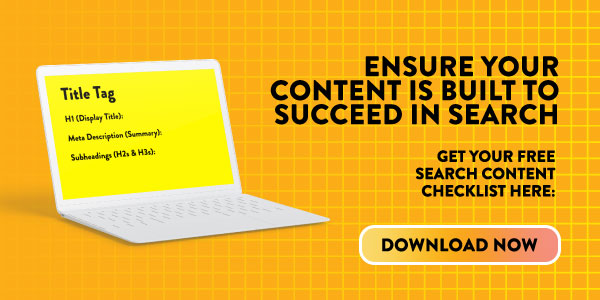There’s an old saying that “respect is earned, not given”. The idea is that just because you are old, in a position of authority, or have some other credential to your name doesn’t mean you are entitled to deference and respect by all. You have to live up to your credentials, demonstrate your authority, earn the respect of your subordinates, peers, or even pupils. Respect isn’t free.

In the world of search, the same holds true for backlinks: your content must earn links — not demand them, not passively wait for them, not assume they are going to come even when you put in the work to create great content. Links are earned by offering value, and sharing that value with the right audience, repeatedly.
Your Content Doesn’t Deserve Backlinks
I got my start in SEO by building links. The top question I had to answer when asking other sites to link to a page was, “Why should I?”. That’s a good question, and it warrants a good answer. “Because I need the links” is a bad answer, but that — or some thinly-veiled version of it — is the most common one I see and hear sites providing.
A good answer — possibly the best answer — is, “Because the page is relevant to your website’s visitors, and offers unique value for them. This link belongs on your site.” Put differently: if you want to earn links, you must create something of value, for a specific, well-defined online audience. That is the essence of truly linkable content.

Site owners trying to build their backlink profile often think, “my site exists, it needs links, so other sites should link to me.” More specifically, site owners will want to rank product pages, “contact us” pages, and other converting areas of their sites, so these are the pages they’ll target with link building campaigns.
But that doesn’t offer a compelling “Why?” for other sites to link. It doesn’t offer any value or even set up link requests as an exchange. Instead, it looks like what it is: going around the web, soliciting sites to provide free advertising in the form of brand mentions and links.
Unless your brand is truly a household name, you aren’t going to earn many links just by having a website and a marketplace for your goods or services. You’re going to have to put in the work.
But My Competitors Have Links to Similar Pages
If your competitors have links pointing to thin content and converting pages, good for them. That doesn’t mean your best, most sustainable and scalable link opportunities can or should copy what *appears* to have worked for your competition.
Black hat techniques still work, and sometimes it takes Google longer than we’d like to admit to catch on. Sometimes, backlinks aren’t the key to unlocking your competitor’s success, and the raw link count to these pages is a distraction from what really powers their performance. Sometimes, getting there first counts for everything, and you can’t replicate the success that comes with primacy.
Suffice to say: the Google algorithm isn’t linear, and while links unquestionably matter, there are plenty of other confounding variables and mitigating factors that power rankings and organic traffic opportunities. Rather than demanding your share of a competitor’s success, you are best served creating your own formula for achieving your own goals.
Any halfway decent link building campaign will incorporate a competitor backlink analysis, in which their link profiles will get unpacked and a target site list can be constructed around what is working for other sites. Very often, this will yield few viable opportunities — the links your competitors earned with their converting or product pages are garbage links, with noisy anchor text, spammy domains, and outdated or irrelevant content surrounding the links. Or they rely on the strength of a brand name, a PR campaign, or some other one-off event you can’t replicate.

It all comes back to the same thing: earning links on your terms, with your site and your brand, requires content worthy of links. In some limited cases, you can earn links with converting or product pages, but to earn links at scale, you need to create more and better content.
How to Make Link-Worthy Content
- Create content with a specific purpose.
- Create purpose-driven content for a well-defined audience.
- Make your purpose-driven, audience-focused content as good or better than similar content on the web.
Linkable Content Is Content With a Purpose
Step number one is where product pages and conversion channels fall apart on linkability.
If the “specific purpose” of a page is to earn you money, solicit contact information, or drive conversions in any way, that doesn’t make a compelling value proposition for other sites to link to you. In general, all websites are out to make money. Some do it through ads and affiliate relationships; others do it by selling products or services. A few achieve it through donations, subscriptions, and other types of paywalls.
The point is: site owners are out to make money with their sites, so if you want links from them, you have to show them, at minimum, that:
- A link to you won’t cost them anything; and
- A link to you can actually benefit them.
If the purpose of a page is to help you drive conversions, you don’t pass this two-stage smell test. Ad-based sites will sniff out free advertising, and deny the link. Sales-based sites will question how your conversions have any positive impact on their own conversions, and if they are truly relevant to your industry, they may even see you as competition for sales.
You need to create content that isn’t as explicitly conversion-focused. The purpose that makes your content compelling and linkable needs to be informative, entertaining, intriguing, helpful, and generally offering something of value to readers without demanding anything from them. Whatever your niche, industry, or gimmick, the possibilities are only as limited as your imagination.
Linkable Content Has a Real, Clear Audience
Site owners will link to your content if they believe it serves their audience and doesn’t cost them anything. Thus, it behooves you to define or discover an audience served by many different target sites, and craft content that supplements what brings the audience to those target sites.
If your audience isn’t active and visible online, they aren’t “real” in terms of link opportunities. Fortunately, the web is a big place, and every conceivable interest group or niche demographic tends to have some online communities, blogs, and websites they frequent. The linkability of your content depends heavily on your ability to identify these groups, understand what they value and what they dislike, and craft your content accordingly.

You can define your audience in countless ways, but the more general and inclusive targets will tend to have the most target sites associated with them, which you can leverage for links.
For example, if you wanted to define a common acronym like BYOD, that would have a huge, and real, online audience: people who don’t know (or don’t remember) what BYOD stands for when it is used, and what it means when it appears. That isn’t much to have in common, but it is enough to define an audience and drive content creation. Creating world-class content that explains all the nuances of this simple acronym would be highly relevant for many different types of readers and websites, meaning you would have a great opportunity to earn links with it.
Is your content performing in search? Download this free checklist to ensure your content is optimized for search success!
Knowing your audience is also critical to your keyword research. How you answer the queries driving searchers to use keywords depends on who your audience is, and what they mean when they use those keywords.
The better you understand your audience, the better you understand how to truly optimize for your keywords, and craft your content around being the best answer available.
Linkable Content Is Better Than Similar Alternatives
You don’t have to be original. You don’t even have to be particularly creative. You just need to know who you are serving and what they want, then give it to them in a way that ends their search, addresses their pain points, or exhausts the topic.
What this really means is that once you have an audience and a purpose for your content, you need to do some basic research to understand who else has created similar content, what they said and how they said it, and fill in the gaps. Sometimes, that will mean looking at four or five different versions of the same article, seeing what each brings to the conversation, and synthesizing them all into one new, big article.

Alternatively, that might mean looking through the SERPs and seeing if none of the results cover a particularly important part of a topic — for instance, there might be a lot of companies selling coffee, but none do a good job explaining how to make the best possible cup of coffee.
Again, knowing how to make your content better than what’s already out there depends on you knowing who you are trying to reach, and what specifically they need. Quality content is defined by the audience and the purpose of the page.
Your Content Won’t Earn Links Without Help
It bears repeating: the web is a big place. It is easy to go unnoticed, overlooked, or even be aggressively ignored despite having something of value to share.
If you’ve crafted superior content that provides value to a well-defined audience, it will likely languish undiscovered on your website unless you bring it to the people you created it for.
The great thing about creating link-worthy content is that when you present it to relevant target sites, it can speak for itself — they will know whether it is relevant to their audience, and why. They should be familiar with the topic, the similar or alternative content, the pain points being overcome, the value proposition being made — but only once you get it in front of the right people. That requires site-finding, outreach, and repetition.
Link building is not passive, fast, or automatic. It requires dedication, patience, and a great deal of repetition to scale. But even more than that, it requires linkable content to start with.
If the only value your backlinks can provide is to your own site and goals, your link building campaign is dead on arrival. If your backlinks demonstrate the clear value you are providing for free, then you are earning your links — and all the authority and SEO value that goes with them.


